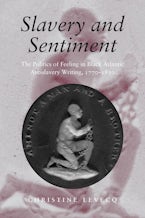- Home
- Becoming Modern: New Nineteenth-Century Studies
- Slavery and Sentiment

Slavery and Sentiment
The Politics of Feeling in Black Atlantic Antislavery Writing, 1770-1850
Published by: University of New Hampshire Press
Series: Becoming Modern: New Nineteenth-Century Studies
324 Pages, 6.00 x 9.00 x 1.10 in
Other Retailers:
From the eighteenth century on, appeals to listeners' and readers' feelings about the sufferings of slaves were a predominant strategy of abolitionism. This book argues that expressions of feeling in those texts did not just appeal to individual readers' inclinations to sympathy but rather were inherently political. The authors of these texts made arguments from the social and political ideologies that grounded their moral and social lives.
Levecq examines liberalism and republicanism, the main Anglo-American political ideologies of the period, in the antislavery texts of a range of African-American and Afro-British authors. Disclosing the political content hitherto unexamined in this kind of writing, she shows that while the overall story is one of increased liberalization of ideology on both sides of the Atlantic, the republican ideal persisted, particularly among black authors with transatlantic connections.
Demonstrating that such writers as Phillis Wheatley, Ignatius Sancho, Olaudah Equiano, Frederick Douglass, and Mary Prince were men and women of their times, Levecq provides valuable new insight into the ideological world of black Atlantic writers and puts them, for the first time, on modernity's political map.
Levecq examines liberalism and republicanism, the main Anglo-American political ideologies of the period, in the antislavery texts of a range of African-American and Afro-British authors. Disclosing the political content hitherto unexamined in this kind of writing, she shows that while the overall story is one of increased liberalization of ideology on both sides of the Atlantic, the republican ideal persisted, particularly among black authors with transatlantic connections.
Demonstrating that such writers as Phillis Wheatley, Ignatius Sancho, Olaudah Equiano, Frederick Douglass, and Mary Prince were men and women of their times, Levecq provides valuable new insight into the ideological world of black Atlantic writers and puts them, for the first time, on modernity's political map.
CHRISTINE LEVECQ is an Assistant Professor in the Humanities at Kettering University in Flint, Michigan.
"While Levecq situates within white British and American literary culture the work of the many black authors she discusses, she is most interested in discovering the varying degrees of liberalism and republicanism, alone or together, that shaped black-authored texts. She sees liberalism and its disembodied form of sympathetic appeal over time assuming dominance in black antislavery writings."—Journal of American History
"Pioneering and provocative, in Slavery and Sentiment Christine Levecq closely reads both black and white writers to argue that the transatlantic English-speaking world saw the development of not one but two often competing and sometimes complementary Black Atlantics during the late eighteenth and early nineteenth centuries. Demonstrating the roles the tension between republican and libertarian concepts of sentiment played in the creation of these Black Atlantics, Slavery and Sentiment should be read by anyone interested in diasporan, literary, and social studies of the period."—Vincent Carretta, Professor of English, University of Maryland, and author of Equiano, the African: Biography of a Self-Made Man



